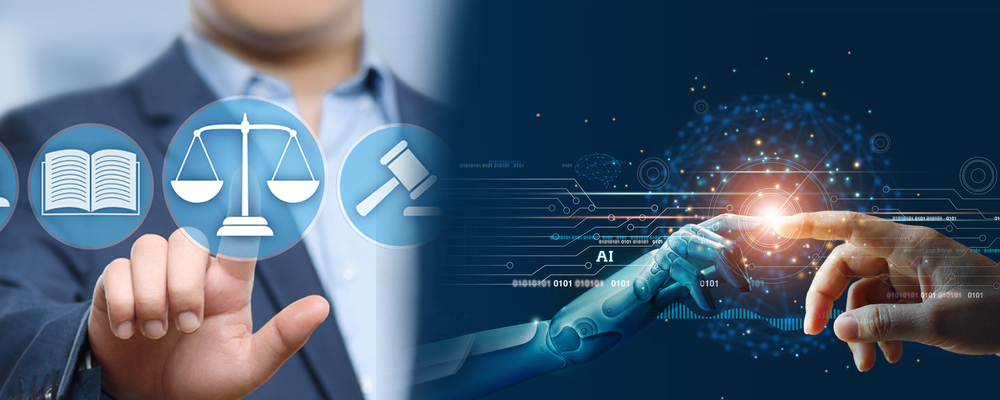Traditionally, it is assumed that law and technology will be at odds with each other. With law favouring the protection of rights while technology aims to foster innovation. Nonetheless, in a lecture by Justice Chandrachud, said that law and technology have an interconnected relationship that can achieve both, the protection of individual rights and the promotion of innovation in society. People always assume the relationship between law and technology is the one where the law is invested in curbing technology. This is because of the presumption that a discipline that relies on history and precedence will never understand much less facilitate a world that constantly seeks to reimagine the future. The use of technology and the internet has not only expanded the scope of an individual’s rights but also their access to the basic services that better help them to realize these rights and liberties.
Before proceeding with the impact and significant relation of law and technology, let us take a glance at the e-Courts Mission Mode project.
E-Courts Project
Based on the National Policy and Action Plan to implement the Information and Communication Technology (ICT) in the Indian judiciary, the e-Courts project was conceptualized. In 2005 this project was submitted by the e-committee, Supreme Court of India with a vision to transform the Indian Judiciary by enabling the ICT in courts.
In pursuance of a proposal received from the Chief Justice of India, the E-committee was established to assist in formulating the National policy on the computerization of the Indian Judiciary as well as advising on technological communication.
Need A Legal Advice
The internet is not a lawyer and neither are you. Talk to a real lawyer about your legal issue

Objective of the E-courts project
- Providing efficient as well as time-bound citizen-centric services in accordance with the e-Courts Litigant’s Charter.
- Developing, installing, and implementing decision support systems in the courts.
- Automating the procedure to provide transparency in accessing the information by the citizens.
- Enhancing judicial productivity, both qualitatively & quantitatively, for making the justice delivery system affordable, accessible, cost-effective, predictable, reliable as well as transparent.
Reach out to Lead India to get expert advice and guidance from the best lawyers in Delhi for dealing with your case at an affordable cost.
E-Court National portal was launched in 2013 where more than 2852 Districts and Taluka Court Complexes have registered and provide case status along with Cause lists online. You can also find orders and judgments of the Courts.
Impact of internet and technology on constitutional rights
It is often argued that the internet is a crucial tool which has vastly improved the work and relevance of the numerous human rights organizations which monitor human rights violations. In the light of this statement, Justice Chandrachud explained the impact of one such technological change, that being the advent of the internet age, on legal rights and structures of governance. He gave an instance where, in 1994, the Freedom Forum’s Media Studies Centre noted that there appears to be a quality of inevitability to the marriage of democratizing technology such as the internet with the world of humanitarian and human rights activities.
Traditionally, the government has controlled platforms through which individuals could make their speech heard to others. However, with the advent of the internet and social media, individuals can now directly be in control of these platforms. An important example of this is during the Egyptian revolution of 2011 when social media platforms were widely used by protestors to organize a protest and to communicate with the outside world in order to highlight the human rights violations being committed by their government. Even in India, the Supreme Court has recognized citizens’ fundamental rights to speak, express, and receive information through the medium of the internet. An individual’s right to privacy on the internet has similarly been upheld by numerous global institutions and courts.
You can file a petition at the Supreme Court for violation of any fundamental rights with the assistance of a lawyer in Delhi by reaching out to Lead India.
In India, in the case of Justice K.S Puttaswamy v Union of India, a bench of nine-judges held that the right to privacy is a fundamental right inherent in the constitution. Justice Chandrachud gave the reasoning that reading the right to privacy as a fundamental right is imperative to the Constitution to protect our people in the digital age where the individual digital identities are equally important as their identities in the physical world.
Effect of Pandemic on the relationship of Law and Technology
COVID 19 proved to be a spectacular accelerant to the virtual and digital courts project in India. When the lockdown was imposed in 2020, the Supreme Court started conducting virtual hearings. However, in the beginning, the judiciary had to mitigate the technological barriers that litigants faced in access to justice. There was also a fear that the pandemic would increase the backlog of cases. Thus immediate response was to create a robust technology that enabled a system that could effectively deal with fresh litigations and concurrently prioritize the pending cases. This led to the effective adoption of the virtual court system by all courts across India by the citizens.
Role of E-Courts Project
The e-committee’s e-Courts project which has been in its second phase since 2015 played a significant role in creating a technology-enabled judicial system that could withstand the novel challenges of the pandemic. Through the e-Courts project, the judges managed to create a system that was conducive for virtual court, electronic filings, and online payments.
How can we help you?
Lead India offers a wide range of top lawyers in Delhi who will ensure justice on time at affordable costs. You can get online legal advice from the best lawyer in Delhi by connecting with us with respect to your legal concern.





 Talk to a Lawyer
Talk to a Lawyer